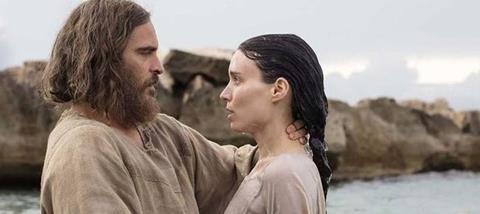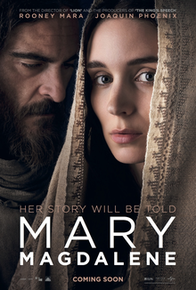
You’d be forgiven for feeling apprehensive about another Hollywood film dealing with Judeo/Christian themes.
Recent attempts to turn Bible stories into blockbusters have frustrated rather than thrilled those who hold these stories to be sacred. Remember the rock monsters in Darren Aronofsky’s Noah? I rest my case.
Many American Christians have decided Hollywood can’t be relied on to produce decent films with a Christian message (Hacksaw Ridge and The Passion of the Christ being the only notable exceptions over the past 15 years). So instead they’ve written and produced their own movies (God’s Not Dead, Fireproof, Risen). There’s clearly a place for these Christian films – but many of them have tended to be subpar when it comes to production values. They’ve also been accused of being more preachy than cinematic.
Is there a third way? Is it possible to produce a film which draws on the biblical story and remains faithful to it (no rock monsters) while also being well-acted, scripted and delivered? The release of Mary Magdalene this Easter suggests the answer is yes.
The film is produced by the team behind The King’s Speech and directed by Garth Davis, whose 2016 film Lion was nominated for six academy awards, including best picture. Davis’ latest production is a simple retelling of the story of Jesus of Nazareth through the eyes of Mary, who leaves behind the security of her family in order to follow a man she believes to be the Messiah. While the disciples are convinced a fiery, violent revolution will come, Mary slowly gains a deeper understanding of Christ’s message.
Mary Magdalene isn’t perfect. This two-hour long film is slow-moving and often drags. The landscapes look nothing like Israel (the film was shot in Italy – and it shows). And the solemn tone means the entertainment value is diminished.
That said, the film has done well to (mostly) stay true to the Bible’s narrative. Jesus is played wonderfully by Joaquin Phoenix. His depiction of a Christ who has moments of human weakness (he's physically exhausted after performing miracles) and carries a heavy burden raises all sorts of interesting and thought-provoking theological questions.
Some will no doubt bemoan the filmmakers’ decisions to re-imagine some of the finer details contained in the Gospel accounts. But often they're merely filling in the blanks left by the Bible. For example, the gospels don't explain Mary's backstory, so the film takes a good educated guess. In the main audiences are provided with entirely plausible story lines. The producers haven't played fast and loose with the biblical story, they've respected it.
Some have described the production as having a “strong feminist bent”. This is mainly because Mary Magdalene's understanding of Jesus message is contrasted with the male disciples misunderstandings. But is this really a problem? After all, the gospels don't exactly paint the male disciples in the most positive light. It's possible some of Jesus early female followers understood Jesus' mission better than the twelve apostles.
Whatever you think of the finer details of the film, ultimately Mary Magdalene leaves audiences with a crystal-clear picture of who Christ was, what he did and why he came. And any Hollywood production which does that must surely be welcomed by those who take the Bible seriously.
Mary Magdalene is showing in UK cinemas from 16 March
Damaris Media have published a free companion booklet to the film, which is available now
Click here for a free sample copy of Premier Christianity magazine




























